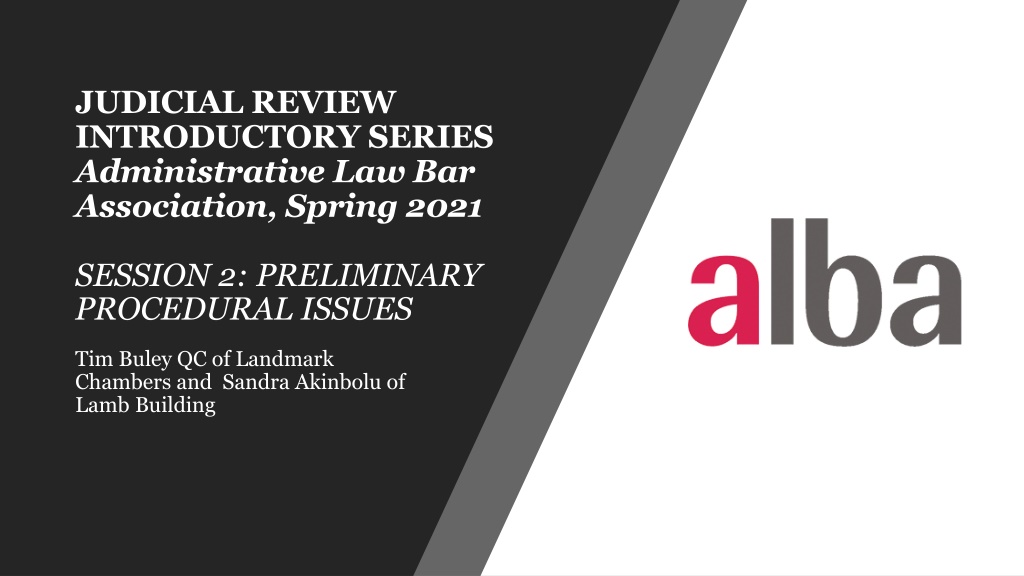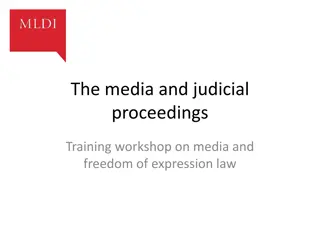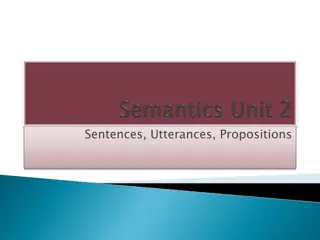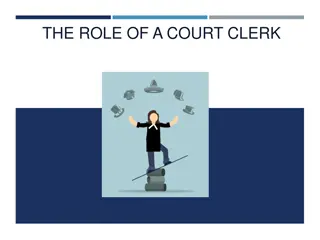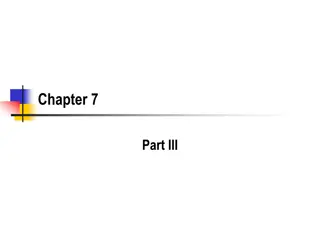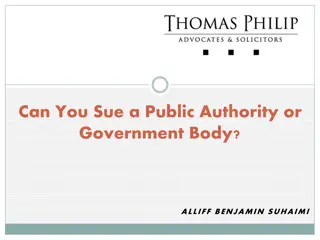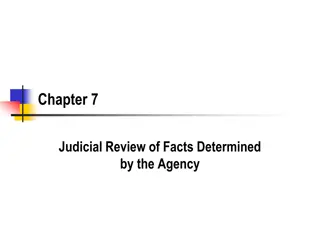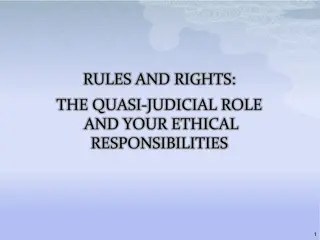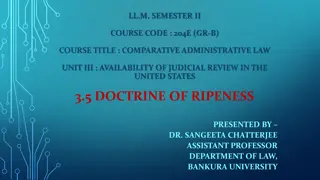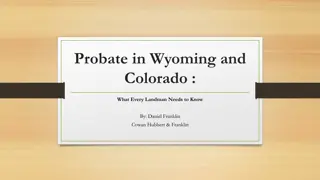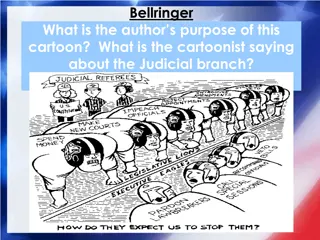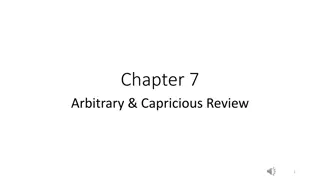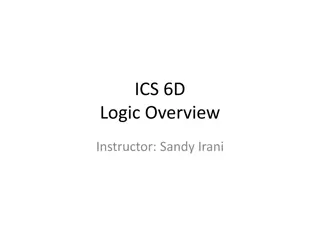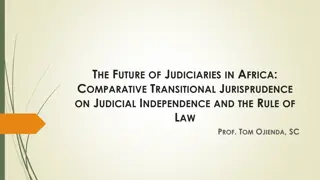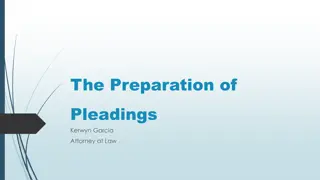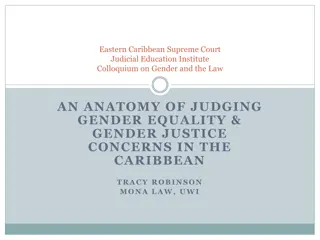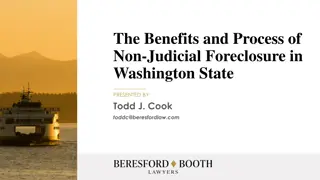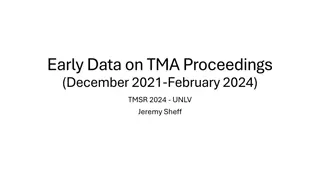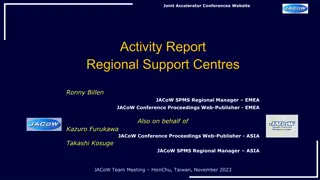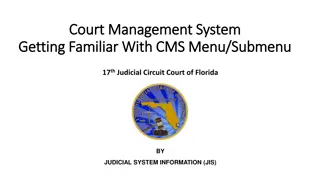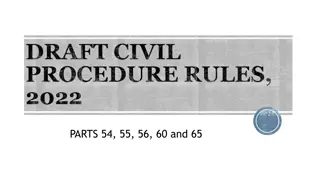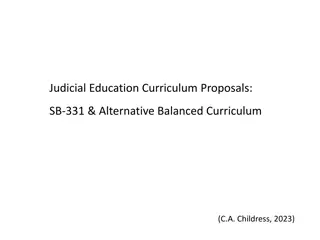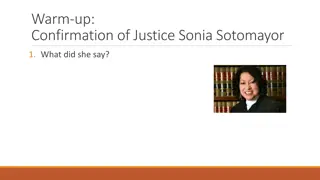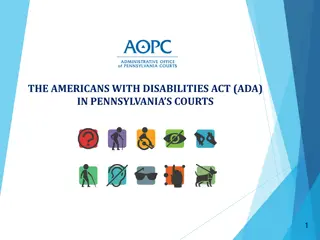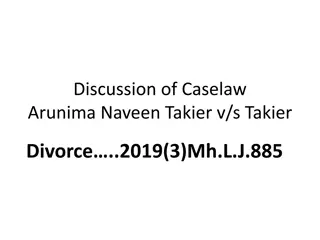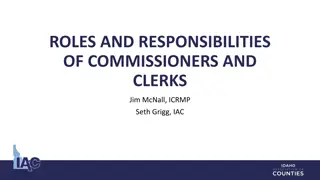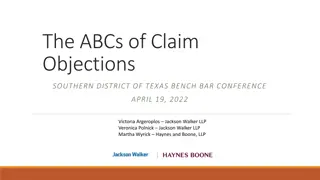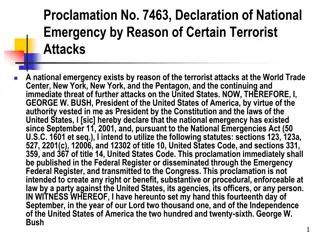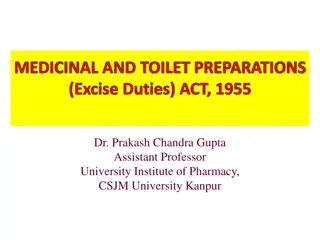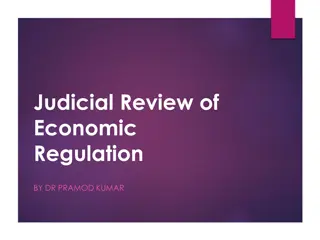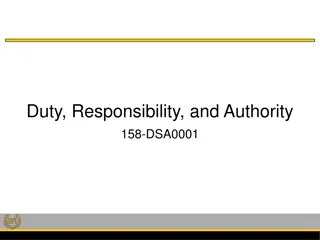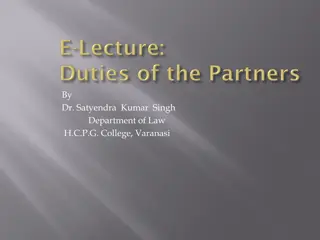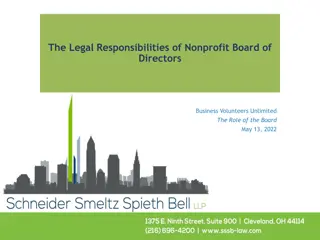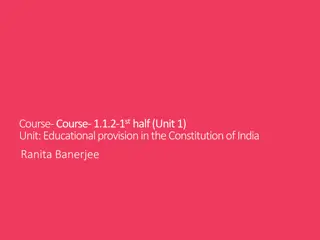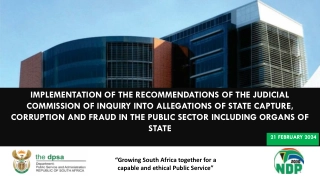Key Duties and Propositions in Judicial Review Proceedings
Key duties and propositions in judicial review proceedings emphasize the importance of cooperation, full disclosure of material facts, and the duty of candor to ensure fairness and uphold the rule of law. Judicial parties are expected to work collaboratively with the court and each other, providing relevant information transparently and assisting in the pursuit of justice.
Download Presentation

Please find below an Image/Link to download the presentation.
The content on the website is provided AS IS for your information and personal use only. It may not be sold, licensed, or shared on other websites without obtaining consent from the author. Download presentation by click this link. If you encounter any issues during the download, it is possible that the publisher has removed the file from their server.
E N D
Presentation Transcript
JUDICIAL REVIEW INTRODUCTORY SERIES Administrative Law Bar Association, Spring 2021 SESSION 2: PRELIMINARY PROCEDURAL ISSUES Tim Buley QC of Landmark Chambers and Sandra Akinbolu of Lamb Building
KEY DUTIES/ PROPOSITIONS: Judicial review is a cooperative enterprise. Fordham, Judicial Review Handbook, 6thedn, 2012, 10.1: The supervisory jurisdiction works best as a relationship of mutual respect and cooperation between Court and defendant public authority Judges have high expectations of the behaviour of judicial review parties and their representatives, and will expect cooperation with the Court, with each other, and with the process. CPR 1.3 provides that: 3. The parties are required to help the court to further the overriding objective [of dealing with cases justly and at proportionate cost- CPR 1.1]
KEY DUTIES/ PROPOSITIONS Duty of Candour The duty is to make full and frank disclosure of (i) material facts; and (ii) potential legal impediments to judicial review such as alternative remedy It is an ongoing duty any material changes must be brought to the Court s attention JS v Secretary of State for the Home Department [2021] EWHC 234 (Admin) The duty of candour means that a party's lawyers have a duty to ensure that the judge dealing with the application has the full picture. It does not suffice to provide a bundle of undigested documents, particularly in a document-heavy case (Khan above, paras. 45 to 46). The parties must enable the judge to perceive and be cognisant of all issues without having to read disparate parts of the bundle. It is the duty of claimants to put the pieces of the jigsaw together. They must not expect that a judge will allot time to spotting the matters that need to be considered. Bartulis v Panevezys Regional Court (Lithuania) [2019] EWHC 3504 (Admin)
KEY DUTIES/ PROPOSITIONS Defendant s duties GLD s Guidance on Discharging the Duty of Candour and Disclosure in Judicial Review Proceedings full and fair disclosure of relevant material Disclosure should rarely have to be ordered by court High Standards of fairness In particular, should provide assistance with factual situations and background Not simply a question of documents Citizen's UK v Secretary of State for the Home Department [2019] 1All ER 416 " public authorities are not engaged in ordinary litigation, trying to defend their own private interests. Rather, they are engaged in a common enterprise with the court to fulfil the public interest in upholding the rule of law."
KEY DUTIES/ PROPOSITIONS Urgency is no excuse R (SB (Afghanistan)) v SSHD [2018] EWCA Civ 215 ; [2018] WLR 4457 - A cautionary tale - Cases should be brought promptly, and on notice wherever possible (Hamid) v Secretary of State for the Home Department [2012] EWHC 3070 (Admin) Section 16 Administrative Court Guide
Venue (Administrative Court or Upper Tribunal) Since 2013, the following heard in the Upper Tribunal any application for permission to apply for judicial review and any application for judicial review (including any application for ancillary relief and costs in such applications) that calls into question: i. a decision made under the Immigration Acts (as defined in Schedule 1 to the Interpretation Act 1978) or any instrument having effect (whether wholly or partly) under an enactment within the Immigration Acts, or otherwise relating to leave to enter or remain in the United Kingdom outside the immigration rules; or ii. a decision of the Immigration and Asylum Chamber of the First-tier Tribunal, from which no appeal lies to the Upper Tribunal.
Venue (Administrative Court or Upper Tribunal) Exceptions: i. a challenge to the validity of primary or subordinate legislation (or of immigration rules); ii. a challenge to the lawfulness of detention (unless it is a decision in relation to bail); iii. a challenge to a decision concerning inclusion on the register of licensed Sponsors or any authorisation of such Sponsors; iv. a challenge to a decision as to citizenship under the British Nationality Act 1981 v. a challenge to a decision made regarding accommodation or (support for asylum seekers) of IAA 1999; vi. a challenge to a decision of the Upper Tribunal; vii. a challenge to a decision of the Special Immigration Appeals Commission; viii. an application for a declaration of incompatibility under section 4 of the Human Rights Act 1998; ix. a challenge to a decision which is certified to have been taken wholly or partly in the interests of national security; or x. a challenge to a decision which is certified to have been taken wholly or partly in reliance on information which it is considered should not be made public in the interests of national security.
CPR Part 54 procedure CPR 54 Practice Directions Administrative Court Guide
Standing SCA 1981 s.31(3) Court will not normally hear a case unless the applicant/Claimant has sufficient interest in the matter to which is relates Broad Approach direct personal interest responsible pressure group or campaign group company incorporated for the purpose of bringing proceedings Individuals with specific concerns
Standing R (Save Our Surgeries Ltd) v Joint Committee of Primary Care Trusts and Newcastle upon Tyne Hospitals NHS Foundation Trust [2013] EWHC 439 (Admin) Court will consider costs in bringing proceedings R v IRC, ex p. National Federation of Self-Employed and Small Businesses Ltd. [1982] AC 617 Court will usually hear merits of argument before considering whether the Claimant has standing
Standing Sufficient Interest R (Al-Haq) v Secretary of State for Foreign and Commonwealth Affairs [2009] EWHC 1910 (Admin) Must be affected in an identifiable way R (Unison) v NHS Wiltshire Primary Care Trust and Secretary of State for Health [2012] EWHC 624 (Admin) Must demonstrate some particular interest to show not merely a busybody R v Inland Revenue Commissioners ex p. National Association of Self- Employed and Small Businesses Ltd [1982] AC 617 Walton v Scottish Ministers [2012] UKSC 44
Standing HRA 1998 s.7(3) Must be a victim Lancashire CC v Taylor [2005] EWCA Civ 284 Thus NGOs and activist groups unlikely to be victims, unless organisation (not members) directly affected Eg R (Broadway Care Centre Ltd.) v Caerphilly County Borough Council [2012] EWHC 37 (Admin)
Standing Recent cases of interest JS v Secretary of State for the Home Department [2021] EWHC 234 (Admin) Delve & Anor, R (On the Application Of) v The Secretary of State for Work And Pensions [2020] EWCA Civ 1199
